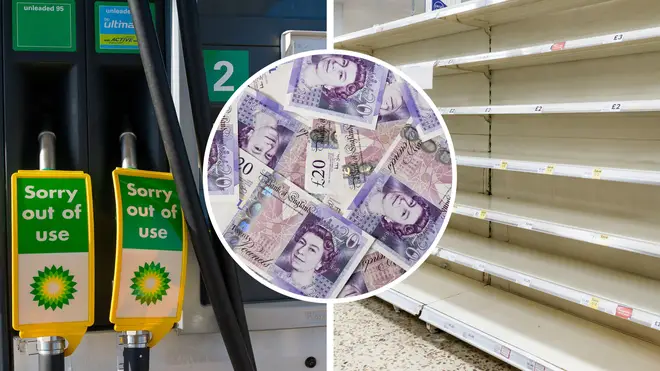
Paul Brand 10am - 12pm
11 November 2021, 07:15 | Updated: 11 November 2021, 08:35

The UK's economic growth slowed sharply between July and September as Britain's post-pandemic recovery was hampered by supply chain problems, according to the ONS.
The economy expanded by 1.3 per cent in that quarter - down from 5.5 per cent in the previous one.
The ONS said September's growth of 0.6 per cent was better than expected, but performance in July and August was worse than first thought as the global supply chain issues began to bite.
The figures mean the economy is now 2.1 per cent below pre-pandemic levels.
Read more: John Cleese pulls out of Cambridge University talk over 'woke rules'
Read more: Cities are 'doers' in tackling climate change but governments are 'delayers' - Khan

Andrew Neil: 'Major' problems in the pipeline for the economy
Grant Fitzner, chief economist at the ONS, said the growth was led by the health sector and a rush to complete on house sales before the end of the stamp duty holiday - but was offset by a number of other things, including a reduction in car sales due to a shortage of parts.
"Growth picked up in September and the UK economy is now only slightly below pre-pandemic levels," said Mr Fitzner.
"This latest increase was led by the health sector, boosted by more visits to GP surgeries in England.
Read more: Geoffrey Cox has 'earned more than £6m from his second job' since he entered parliament
Read more: Does your MP have a second job? Find out here
"Lawyers also had a busy month as house buyers rushed to complete purchases before the end of the stamp duty holiday.
"However, these were partially offset by falls in both the manufacture and sale of cars.
"Notably, business investment remained well down on pre-pandemic levels in the three months to September."
Construction projects were also delayed amid difficulties in getting materials, according to the ONS.

Business Sec pressed on whether shortages could have been avoided
Chancellor Rishi Sunak put a positive spin on the figures, saying that whilst he knew there were "challenges to overcome", the growth showed the economy was continuing to bounce back from the pandemic.
"The economy continues to recover from Covid and thanks to schemes like furlough, the unemployment rate has fallen for eight months in a row and we’re forecast to have the fastest growth in the G7 this year," said Mr Sunak.
"As the world reopens we know that there are still challenges to overcome.
"That’s why at the Budget last month I set out our plan to build a stronger economy for the British people.
"We’re continuing to support businesses, jobs and people so that we can achieve our vision of a high-skill, high-productivity economy where work is rewarded."
Read more: 'Rotten at the heart': 50 Tory MPs rake in over £1.7m in consultancy fees this year
Read more: Meghan Markle apologises for 'misleading' court in privacy battle
But Shadow Chief Secretary to the Treasury Bridget Phillipson said the economy risked "grinding to a halt" and said "urgent action" was needed.
"This morning's GDP figures confirm that the economic recovery is slowing and risks grinding to a halt," said Ms Phillipson.
"We need urgent action to keep the economy moving and support households as we head into the winter, as prices rise and as the cost of living crisis continues to escalate.
"The Budget showed that the government is trapping us in a cycle of high taxes and is risking our recovery by not growing our economy.
"Labour will tax fairly, spend wisely and, after a decade of faltering growth, we'll get Britain’s economy firing again with our plan to buy, make and sell more in Britain."

Nick Ferrari quizzes the Prime Minister on the petrol crisis
The figures come after the Bank of England held off from raising interest rates, despite soaring inflation.
It wanted to see how the jobs market - and wider economy - was coping with the supply chain issues and the end of furlough.
Today's slowdown therefore raises the threat of "stagflation" - when slow growth is combined with rising inflation.
A rising cost of living, with soaring energy and fuel costs, is adding to the problem.
The Bank has warned that inflation will jump from 3.1 per cent to 4.5 per cent by November and hit around 5 per cent next April, putting it at its highest level for a decade.
Read more: Interest rate hike due in 'coming months,' Bank of England warns
The figures from the ONS also revealed a 2.9 per cent jump in fuel sales by volume in September amid panic-buying on forecourts caused by some petrol station closures due to driver shortages.